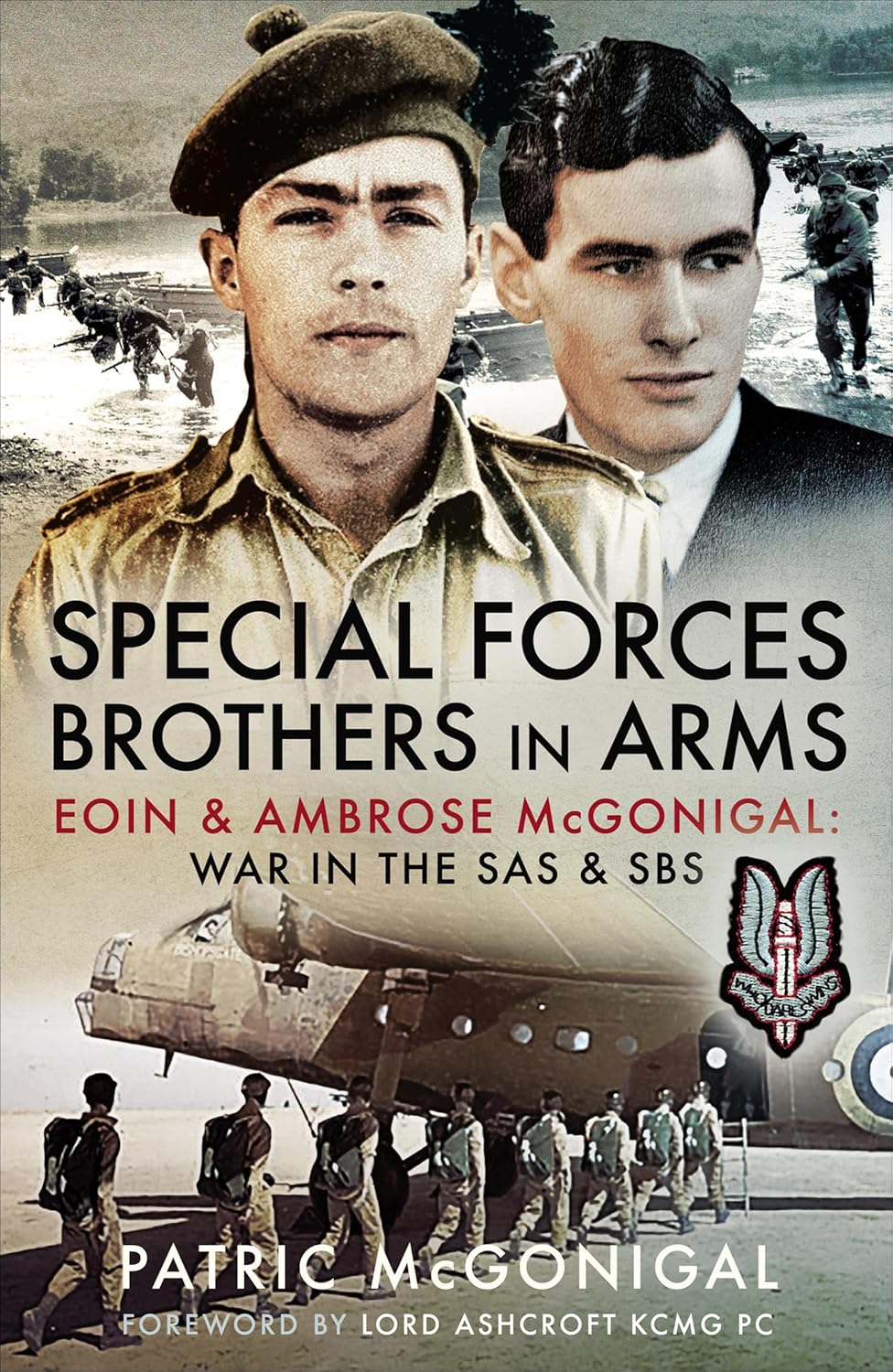
Special Forces Brothers in Arms: Eoin & Ambrose McGonigal: War in the SAS & SBS
FREE Shipping
Special Forces Brothers in Arms: Eoin & Ambrose McGonigal: War in the SAS & SBS
- Brand: Unbranded

Description
With the disbandment of 12 Commando, Ambrose’s next posting was to “Layforce II” – a group of small -scale raiding forces brought together to conduct a series of high-risk, hit-and-run raids in Motor Torpedo Boats (MTBs) along the French coast and Channel Islands. During December 1943, reconnaissance operations were stepped up for “Operation Overlord” – this was the codename for the Battle of Normandy, the Allied operation to liberate German-occupied western Europe.
Ambrose’s career as a lawyer and judge are very interesting to read about, as is his attitude to having to have a bodyguard at all times, and to protect his family from those who wanted to kill them due to his chosen career. (Like Catholics in the RUC, Catholic Judges spoiled the narrative that there were no Catholics in those professions, so the IRA used their own means to reduce the numbers.) Although a pillar of the Establishment, he was renowned for being fair to all who came before him. At a time when hanging was still a mandatory sentence for certain crimes in Northern Ireland, his approach was fair to the Establishment, the victim, the criminal and the changes he could see coming through in society. This was a man I'd like to have met. Despite the demands of his large practice, McGonigal found time to take on many onerous and important positions in public life. In 1945 he was appointed chairman of the Irish railway wages board, and later he was chairman of the Joint Industrial Council as well as a member of the banks’ arbitration tribunal. His appointments to important bodies in the sensitive fields of industrial relations and salary fixing were a recognition of his sense of fairness and impartiality. Ambrose McGonigal, MC and Bar, carried out many coastal raids with the SBS and led local resistance fighters in Yugoslavia. His career, although longer than his brother’s, doesn’t receive quite the same coverage. Eoin joined up first and his story is entwined with the story of the birth of Special Forces as we know them today, which means there is more to say.
Military Person
Ambrose Joseph McGonigal was born in Dublin on November 22 1917 – during the second half of the First World War and just a year after the Easter Rebellion that saw armed resistance to British rule. His younger brother, Eoin, was born three years later in 1920, the same year that the Government of Ireland Act was passed that resulted in the partition of the country the following year. However, Ambrose, also had a much older brother, Richard, who was 15 years his senior, and four sisters. After demobilisation with the rank of major in 1946 McGonigal studied law as a bar student at QUB, and was called to the Northern Ireland bar in Michaelmas term 1948, aged thirty, having been exempted in view of his war service from the requirement to have a degree. Despite competition from contemporaries who had served in the war and were also called to the bar in its aftermath, he soon made his mark as a member of the junior bar, becoming a QC in 1956. As a silk he had a general common law practice, and in 1964 his standing as one of the leaders of the senior bar was confirmed by his appointment as senior crown prosecutor for Co. Down and election as a bencher of the Inn of Court of Northern Ireland. Although judicial appointments at all levels in Northern Ireland had hitherto been made predominantly from Unionist politicians or supporters, when it was decided to increase the complement of the Northern Ireland high court by two additional judges, McGonigal was the obvious candidate to fill one of the new posts – the other being the attorney general E. W. Jones QC MP; they were appointed on 3 March 1968. Eoin was one of the first two officers selected from an Irish Regiment for Commando training in 1940, and the stories of his training in Arran alongside Mayne are highly entertaining. They were the closest of friends, and it’s intriguing to me that after the disappearance of Eoin on the first ever SAS parachute drop (in Libya), Mayne was incredibly distressed and angry, which may help to explain some of his later behaviours which have been discussed at length elsewhere. The book also sheds light on why Mayne’s VC award was downgraded. Lieutenant McGonigal joined the Royal Ulster Rifles in 1939 and was subsequently attached Cameronians (Scottish Rifles) in 1940.
He became great friends with the legendary Lieutenant Colonel Robert Blair Mayne as their career paths were the same. In 1922, the year that the Irish Free State came into existence, the family moved to Belfast, the home city of John McGonigal, who was one of no less than 17 siblings. Such a move had its challenges but John went on to become the chief crown prosecutor for Belfast and, in time, was elected the “father” of the Northern Irish Bar and appointed to the bench as a judge in Tyrone. Having been badly injured during a raid, McGonigal was rumoured to have been taken Prisoner of War but subsequently died of his wounds on the same day. His death prompting Blair Mayne to write to his Sister Frances "I am getting very tired of this Country, especially since Eoin landed a loser" [4] Burial place [ edit ]Justice McGonigal is mentioned in Tony Geraghty's The Irish War: the hidden conflict between the IRA and British Intelligence [5] as having been "forced to carry a gun under his robe" due to terrorism in Northern Ireland, which would claim the lives of at least five judges or justices in Northern Ireland.
- Fruugo ID: 258392218-563234582
- EAN: 764486781913
-
Sold by: Fruugo
